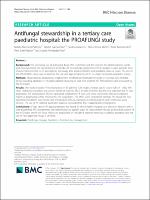| dc.contributor | Vall d'Hebron Barcelona Hospital Campus |
| dc.contributor.author | Mendoza Palomar, Natalia Ana |
| dc.contributor.author | Garcia Palop, Beatriz Magdalena |
| dc.contributor.author | Melendo Perez, Susana |
| dc.contributor.author | Martin Gomez, M Teresa |
| dc.contributor.author | Renedo Miro, Berta |
| dc.contributor.author | Soler Palacín, Pere |
| dc.contributor.author | Fernandez Polo, Aurora |
| dc.date.accessioned | 2021-05-19T12:36:36Z |
| dc.date.available | 2021-05-19T12:36:36Z |
| dc.date.issued | 2021-01-22 |
| dc.identifier.citation | Mendoza-Palomar N, Garcia-Palop B, Melendo S, Martín MT, Renedo-Miró B, Soler-Palacin P, et al. Antifungal stewardship in a tertiary care paediatric hospital: the PROAFUNGI study. BMC Infect Dis. 2021 Jan 22;21:100. |
| dc.identifier.issn | 1471-2334 |
| dc.identifier.uri | https://hdl.handle.net/11351/5964 |
| dc.description | Teràpia antifúngica; Gestió antimicrobiana; Pediatria |
| dc.description.sponsorship | This study was supported by an Investigator-Sponsored Research grant from Gilead Sciences. Gilead provided grant support for this study, but did not take part in the study design, data collection, or analysis of the results. |
| dc.language.iso | eng |
| dc.publisher | BMC |
| dc.relation.ispartofseries | BMC Infectious Diseases;21 |
| dc.rights | Attribution 4.0 International |
| dc.rights.uri | http://creativecommons.org/licenses/by/4.0/ |
| dc.source | Scientia |
| dc.subject | Medicaments - Prescripció |
| dc.subject | Medicaments antifúngics - Ús terapèutic |
| dc.subject | Infants |
| dc.subject.mesh | Antifungal Agents |
| dc.subject.mesh | /therapeutic use |
| dc.subject.mesh | Drug Prescriptions |
| dc.subject.mesh | Child |
| dc.title | Antifungal stewardship in a tertiary care paediatric hospital: the PROAFUNGI study |
| dc.type | info:eu-repo/semantics/article |
| dc.identifier.doi | 10.1186/s12879-021-05774-9 |
| dc.subject.decs | antifúngicos |
| dc.subject.decs | /uso terapéutico |
| dc.subject.decs | prescripciones de medicamentos |
| dc.subject.decs | niño |
| dc.relation.publishversion | https://doi.org/10.1186/s12879-021-05774-9 |
| dc.type.version | info:eu-repo/semantics/publishedVersion |
| dc.audience | Professionals |
| dc.contributor.organismes | Institut Català de la Salut |
| dc.contributor.authoraffiliation | [Mendoza-Palomar N, Melendo S, Soler-Palacin P] Unitat de Malalties infeccioses i immunologia pediàtrica, Vall d’Hebron Hospital Universitari, Barcelona, Spain. Vall d’Hebron Institut de Recerca (VHIR), Barcelona, Spain. Universitat Autònoma de Barcelona, Bellaterra, Spain. [Garcia-Palop B, Renedo-Miró B, Fernández-Polo A] Servei de Farmàcia, Vall d’Hebron Hospital Universitari, Barcelona, Spain. Vall d’Hebron Institut de Recerca (VHIR), Barcelona, Spain. [Martín MT] Servei de Microbiologia, Vall d’Hebron Hospital Universitari, Barcelona, Spain. Vall d’Hebron Institut de Recerca (VHIR), Barcelona, Spain. Universitat Autònoma de Barcelona, Bellaterra, Spain |
| dc.identifier.pmid | 33482749 |
| dc.identifier.wos | 000612937200002 |
| dc.rights.accessrights | info:eu-repo/semantics/openAccess |

